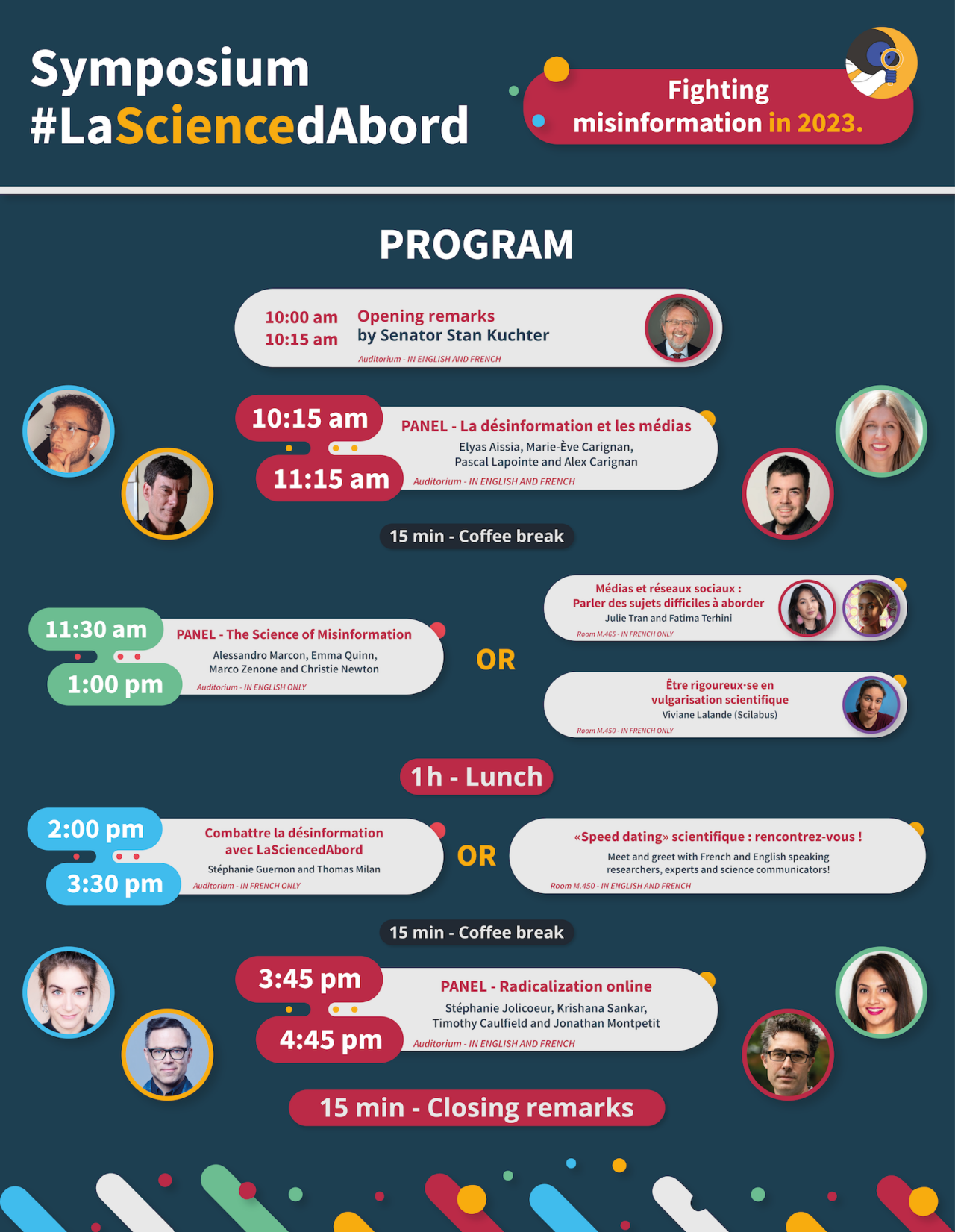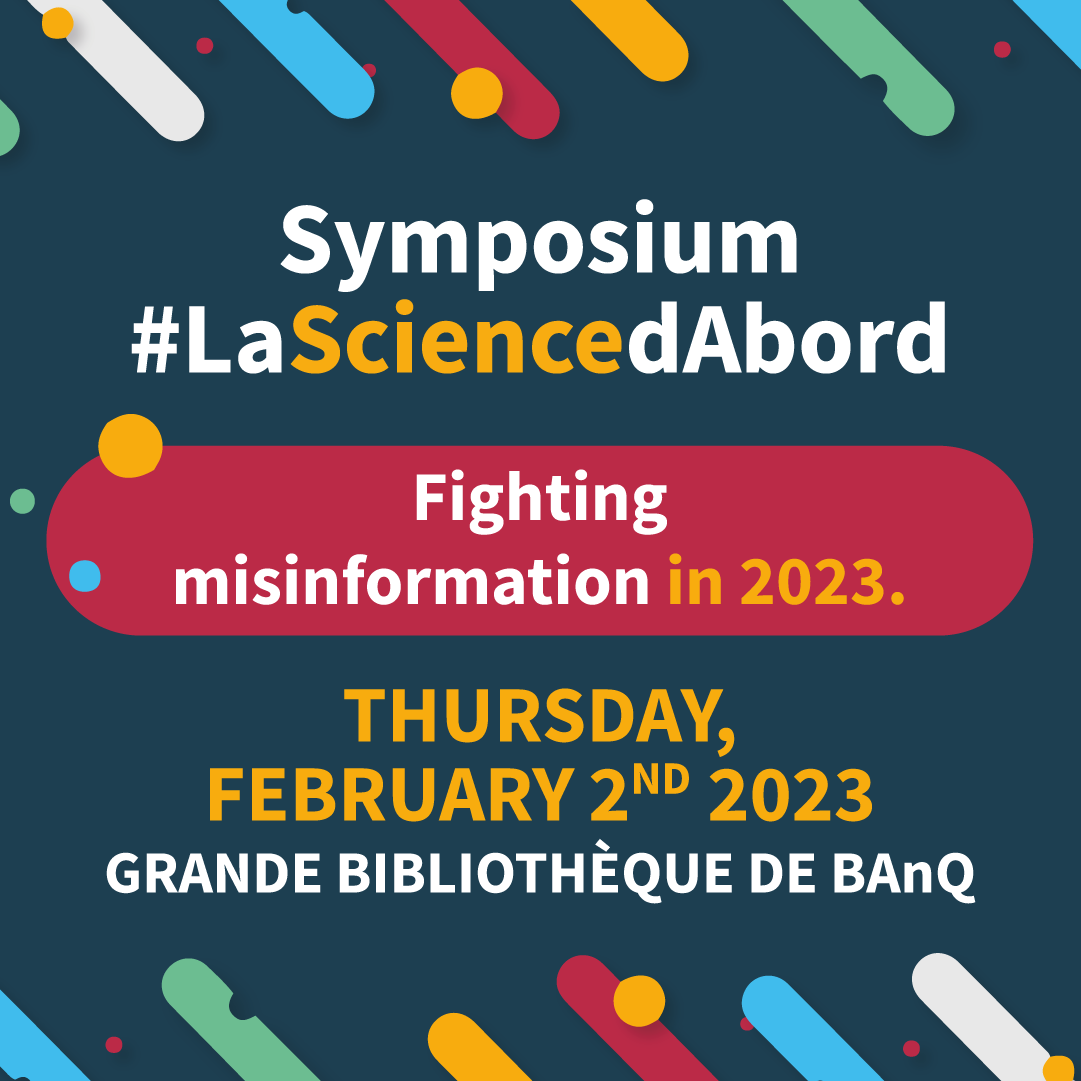Symposium
#LaSciencedAbord
Fighting misinformation in 2023
The pandemic has put a long running issue in the spotlight: misinformation. It’s clear that the main fight for science communicators across the world is the prevalence of misinformation on social media.
On February 2nd, ScienceUpFirst hosted a one day symposium to provide researchers, science and health communicators, educators and students with the tools to effectively fight misinformation in 2023.
Please enjoy the recordings below of some of the day’s events.
Date and Time
Thursday, February 2nd, 2023
10:00 AM – 5:00 PM EST
Location
La grande bibliothèque de BAnQ
475 Boul. de Maisonneuve E
Montréal, QC H2L 5C4
Event Information
The symposium will feature both French and English keynote panels with the choice of 4 workshops and a panel on science communication and the use of social media.
The day will be capped off with a bilingual social meet and greet with expert and amateur science communicators.
Health and Safety
The health and safety of our participants are a top priority. Please note the following recommendations:
- Please stay home if you or anyone in your household is symptomatic of a respiratory infection.
- While wearing masks in public spaces is no longer mandated, this is a mask-friendly event. Masks are highly encouraged and will be provided along with hand sanitizer.
- We encourage participants to be up to date on their COVID-19 vaccines and boosters for optimal protection.
- The venue has two-stage air filtration and monitors levels of CO2.

Opening and Closing Keynote Panels
In person and live streamed
Opening Panel: “Misinformation and Media”
10:15 AM – 11:15 AM
Join our panel of experts as we dive deep into misinformation and the media. The media landscape has been turned upside down by COVID-19, and the effects of the “infodemic” have taken its toll on our traditional and online channels. We will be joined by Professor Marie-Eve Carignan, Dr. Alex Carignan, and journalist Pascal Lapointe to discuss the challenges faced by science journalists and communicators, and the tools they recommend to combat misinformation.
Moderated by Elyas Aissia.
This panel will be in French with live translation.
Closing Panel: “Radicalization Online“
3:45 PM – 4:45 PM
The online information highway is loud, crowded and sometimes dangerous. Misinformation spreads rapidly, and can sometimes spark radical reactions from groups and individuals. Join misinformation expert Timothy Caulfield, along with CBC journalist Jonathan Montpetit, and Dr. Krishana Sankar for an important discussion about how radicalization occurs, and how as a communicator you can manage your health and wellbeing when communicating on tricky topics. We’ll also leave you with some tips and tricks for spreading the best available science to the public through your channels.
Moderated by Stéphanie Jolicoeur.
This panel will be in English with live translation.
Workshop Information
In person attendees will have 4 incredible workshops to choose from.
11:30 AM – 1:00 PM
Panel – The Science of Misinformation (In person and live streamed)
Auditorium (English only)
Join our panel of experts as we look into the science of misinformation……
- Alessandro Marcon, Research Associate, Health Law Institute
- Making sense of complex misinformation dynamics: Case studies and speculative inquiries. This talk will present some completed and ongoing misinformation-focused social media analyses in the context of the COVID-19 pandemic. It will also present some misinformation dynamics which require further research and consideration, especially in relation to collective and institutional public outreach efforts.
- Marco Zenone, Research Associate, Health Law Institute
- Exploiting Unmet Medical Needs: Alternative Cancer Clinic Social Media Advertising and Google Reviews
- Emma Quinn, Graduate Student, University of British Columbia
- The COVID-19 pandemic has contributed to a worsening ‘infodemic’ in online spaces. This talk will focus on the results of several qualitative content analyses focused on the types of misinformation that cluster together on various social media platforms with COVID-19-relevant hashtags like #hoax, #governmentlies, and #masksdontwork.
- Christie Newton, Graduate Student, University of Regina
- Understanding journalistic norms outpredicts misinformation detection relative to trusting the actions of journalists
Being rigorous in science communication.
Room M450 (French only)
We often think that we need to simplify our words to be accessible and understandable. It’s true. But will this simplification change the message? No… and that’s the art of good communication: simplification without distortion. In this workshop we’ll talk about how to make sure we keep the rigor of the information while making it accessible. A real balancing act!
Presentation by: Dr. Viviane Lalande, science communicator, trainer, columnist, and creator of Scilabus.
What’s hiding behind the words we see online?: the importance of going back to basics for cognitive justice.
Room M465 (French only)
The reappropriation of social concepts online is increasingly present: intersectionality, feminism, self care etc. These terms that originated from progressive studies have become socially charged. What happens when these terms are used outside their political context? This presentation will examine this question through the lens of cognitive justice.
Presentation by: Julie Tran (She/her), community researcher and doctoral student in social work and Fatima Terhini (She/her), speaker on feminist and antiracist issues
2:00 PM – 3:30 PM
From topic to publication: how do we do it?
Auditorium (French only)
Proactively combating misinformation takes time and resources but, above all it’s a question of process. Join our team to learn how we work and how we create engaging and informative social media content!
Thomas Milan and Stéphanie Guernon from ScienceUpFirst will breakdown our process in this interactive workshop.
Scientific “Speed dating”!
Room M450 (Bilingual)
Meet and talk with French and English experts, researchers and science communicators during our Scientific Speed Dating! This session will create opportunities to break down the barriers between the different roles in science research and communication.
Led by Elyas Aissia and Denis Chmoulevitch from ScienceUpFirst, participants will have the opportunity to join three different discussion rounds.

